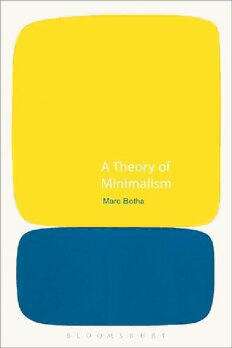
A Theory of Minimalism PDF
Preview A Theory of Minimalism
A Theory of Minimalism Also available from Bloomsbury Reparative Aesthetics, Susan Best Aesthetics and Architecture, Edward Winters Aesthetics and Painting, Jason Gaiger Expanded Painting, Mark Titmarsh Aesthetics of Ugliness: A Critical Edition, Karl Rosenkranz A Theory of Minimalism Marc Botha Bloomsbury Academic An imprint of Bloomsbury Publishing Plc Bloomsbury Academic An imprint of Bloomsbury Publishing Plc 1385 Broadway 50 Bedford Square New York London NY 10018 WC1B 3DP USA UK www.bloomsbury.com BLOOMSBURY and the Diana logo are trademarks of Bloomsbury Publishing Plc First published 2017 © Marc Botha, 2017 Marc Botha has asserted his right under the Copyright, Designs and Patents Act, 1988, to be identified as Author of this work. All rights reserved. No part of this publication may be reproduced or transmitted in any form or by any means, electronic or mechanical, including photocopying, recording, or any information storage or retrieval system, without prior permission in writing from the publishers. No responsibility for loss caused to any individual or organization acting on or refraining from action as a result of the material in this publication can be accepted by Bloomsbury or the author. British Library Cataloguing-in-Publication Data A catalogue record for this book is available from the British Library. ISBN: HB: 978-1-4725-3030-1 ePDF: 978-1-4725-3086-8 ePub: 978-1-4725-2654-0 Library of Congress Cataloging-in-Publication Data A catalog record for this book is available from the Library of Congress. Cover design by Clare Turner Cover image © Ellsworth Kelly Typeset by Fakenham Prepress Solutions, Fakenham, Norfolk NR21 8NN For my parents, Neville and Annette vi Contents Acknowledgements xii Preface xiii 1 Intermittency: On the Transhistoricism of Minimalism 1 1.1 Minimum 1 Minimalism as existential modality: Frans Vanderlinde’s Elimination/Incarnation (1967) 1.2 Intermittency 3 The transhistorical register of minimalism: Dan Flavin’s monument 1 to V. Tatlin (1964) 1.3 Margins 10 At the periphery of minimalism: Robert Hooke’s Micrographia (1655) John Lee Byars’s The Book of the Hundred Questions (1969) 1.4 Movement 12 Minimalism as a dynamic movement: La Monte Young’s Trio for Strings (1958) 1.5 Minimalism 17 Name as paradigm: Donald Judd’s Untitled (Stack) (1967) 1.6 Transition 21 Between modernism and postmodernism: Ronaldo Azeredo’s VELOCIDADE (1957) Ai Weiwei’s A Ton of Tea (2007) 2 Encounters: On the Politics of Minimalism 27 2.1 Threshold 27 Between art and non-art: Carl Andre’s Venus Forge (1980) viii Contents 2.2 Encounter 31 Minimalism and the sustained encounter: La Monte Young’s Dream Houses (1966–70) 2.3 Perception 36 Embodied perception as a generative process: Robert Morris’s untitled (3 Ls) (1965–70) 2.4 Disruption 41 Minimalism and the politics of public space: Richard Serra’s Tilted Arc (1981) 2.5 Force 46 Micro-political apertures to macro-political events: Frank Stella’s Arbeit Macht Frei (1967) 2.6 Anticipation 50 Unexpected epiphanies and the politics of the everyday: Raymond Carver’s ‘Fat’ (1971) 3 Objecthood: On the Materialism of Minimalism 57 3.1 Objects 57 Minimalism and theoretical objecthood: Steve Reich’s Clapping Music (1972) 3.2 Form 61 The architecture of objecthood: Sol LeWitt’s Incomplete Open Cubes (1974) Frank Stella’s Tomlinson Court Park (1967) Teju Cole’s Seven Short Stories About Drones (2013) 3.3 Immanence 67 Presence and scale: Steve Reich’s Four Organs (1970) Barnett Newman’s Cathedra (1951) 3.4 Medium 70 On migratory objecthood: Dan Flavin’s untitled (to the real Dan Hill) 1b (1978) Contents ix 3.5 Nonreferentiality 74 Mimetic economy and minimalism: Ellsworth Kelly’s Spectrum IV (1967) Robert Lax’s ‘is’ (1962) 3.6 Process 78 Minimalism in motion: Ian Hamilton Finlay’s acrobats (1964) Steve Reich’s Pendulum Music (1968/1973) 4 The Real: On the Persistence of Minimalism 83 4.1 Verisimilitude 83 Competing realities: Raymond Carver’s ‘The Bath’ (1981) 4.2 Generativity 89 Approximating the real: Alain Robbe-Grillet’s ‘In the Corridors of the Underground’ (1963) 4.3 Transfiguration 92 A minimalism more-real: Marcel Duchamp’s Fountain (1917) 4.4 Persistence 99 Contingency and absolute becoming: Eva Hesse’s Contingent (1969) Steve Reich’s Piano Phase (1967) 5 Quantity: On the Radicality of Minimalism 107 5.1 Compossibility 107 One and many: Robert Barry’s [This work has been and continues to be refined since 1969] (1971) 5.2 Quantification 111 Quantity as quality in minimalist aesthetics: Donald Judd’s Untitled (Six boxes) (1974) Frank Stella’s Empress of India (1965)
